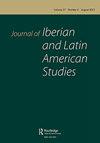在西班牙民主转型(1968-1986)中,公社作为家庭的反文化替代品:一个本体论的方法
IF 0.3
0 HUMANITIES, MULTIDISCIPLINARY
Journal of Iberian and Latin American Studies
Pub Date : 2022-01-02
DOI:10.1080/14701847.2022.2052692
引用次数: 1
摘要
本文关注的是在佛朗哥独裁统治的最后几年和西班牙向民主过渡(1968-1986)期间公社的创建。具体地说,它分析了为什么一些自认为是反文化的人和年轻人在关于社会组织的一般性辩论中将公社视为家庭的替代方案。作为对历史本体论转向的回应,本文表明,人们期望公社进行一场个人革命,并通过对世界和人性的一系列假设的实际实施,开辟一条实现和谐社会关系的道路。本文章由计算机程序翻译,如有差异,请以英文原文为准。
The communes as the counter-cultural alternative to the family within the Spanish democratic transition (1968-1986): an ontological approach
ABSTRACT This article focuses on the creation of communes within the last years of Franco’s dictatorship and Spain’s transition to democracy (1968–1986). Specifically, it analyses why some self-considered counter-cultural and young people conceived the communes as an alternative to the family in a general debate about social organization. Responding to an ontological turn in history, the article shows that communes were expected to carry out a personal revolution and open a way to realise a harmonious social relationship by the practical implementation of a set of assumptions about both the world and human nature.
求助全文
通过发布文献求助,成功后即可免费获取论文全文。
去求助
来源期刊

Journal of Iberian and Latin American Studies
HUMANITIES, MULTIDISCIPLINARY-
CiteScore
0.40
自引率
33.30%
发文量
23
 求助内容:
求助内容: 应助结果提醒方式:
应助结果提醒方式:


